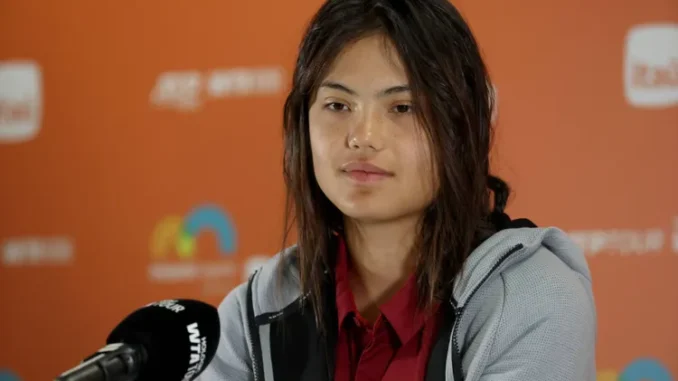
In the fast-paced, high-stakes arena of professional tennis, where every swing of the racket can redefine a career, Emma Raducanu stands at a crossroads. The 22-year-old British star, who stunned the world with her fairy-tale US Open triumph in 2021, has been navigating a turbulent journey since that historic victory. Her undeniable talent has kept her in the spotlight, but it’s her revolving door of coaches that’s sparked a fresh wave of debate. Tennis legend Martina Navratilova, a towering figure with 18 Grand Slam singles titles under her belt, has weighed in with a candid take: “She needs to commit to somebody and stay with them for a little bit.” It’s a plea for stability that echoes through the tennis world as Raducanu’s potential hangs in the balance.
Raducanu’s ascent was meteoric. At just 18, she stormed through the US Open as a qualifier, clinching the title without dropping a set—a feat that etched her name into the sport’s history books. But the years since have been a rollercoaster of highs and lows. Injuries, including surgeries on both wrists and an ankle that sidelined her for much of 2023, have tested her resilience. So too has her approach to coaching. Since her breakout moment, she’s cycled through no fewer than seven mentors, a pattern that’s raised eyebrows and fueled discussions about what she needs to unlock her full potential. Her latest split, with Vladimir Platenik on the eve of the Miami Open in March 2025, left her competing—and impressively reaching the quarter-finals—without an official coach in her corner.
Navratilova’s words cut to the heart of the matter. Watching Raducanu’s recent run in Miami, where she toppled two top-20 players before falling to world No. 4 Jessica Pegula in a grueling three-set battle, the tennis icon sees a player brimming with promise but tethered by inconsistency. “If she stays healthy and plays this well, then she’ll be seeded at Roland Garros,” Navratilova has predicted, envisioning a climb back into the top 30. Yet, she tempers that optimism with a warning: “The biggest question mark is her health.” For Navratilova, though, it’s not just about physical fitness—it’s about the chaos of constant change. Raducanu’s “state of flux,” as she puts it, could be the real hurdle holding her back.
The Miami Open offered a tantalizing glimpse of what Raducanu can achieve. Her resilience shone through as she snatched the second set against Pegula in a tiebreak, even after needing medical attention courtside for dizziness. “It was amazing,” Navratilova marveled, praising how Raducanu regrouped when the match seemed lost. “She won the tie-break, and still competed in the third, but she was not feeling well.” That fighting spirit, paired with her fluid movement and technical prowess, has pundits and fans alike dreaming of a return to the elite. “If she played like she did against Pegula, then the sky’s the limit,” Navratilova declared, a nod to the boundless potential that captivated the world four years ago.
But potential alone doesn’t win titles, and Raducanu’s coaching carousel has become a lightning rod for critique. After parting with Platenik, she leaned on TV commentator Mark Petchey and mentor Jane O’Donaghue in Miami, a makeshift team that steadied her through four straight wins—her best streak since that magical US Open run. Yet Navratilova’s advice rings clear: short-term fixes won’t suffice. “She needs to commit to somebody and stay with them for a little bit, see how that works,” she urged, suggesting that a steady hand could anchor Raducanu’s talent and guide her through the sport’s relentless demands.
Raducanu herself seems aware of the narrative swirling around her. Post-Miami, she reflected on her week with a mix of pride and introspection. “I’m not sure what’s next,” she admitted, her voice tinged with uncertainty. “I think I need to take a beat and reevaluate what I’m doing. This week was good, but I just need to figure things out and make a plan from there.” It’s a candid acknowledgment of a career at a turning point—one where the echoes of her teenage triumph still linger, but the path forward demands clarity.
For now, Raducanu sits just inside the top 50, a ranking that reflects both her struggles and her resurgence. The clay season looms, with the French Open on the horizon, and the tennis world watches eagerly. Can she harness the “movement, resilience, and fighting spirit” that British icon Tim Henman praised in Miami? Will she heed Navratilova’s call to plant roots with a coach and build something lasting? As the young star plots her next move, one thing is certain: her story—equal parts inspiring and unpredictable—continues to unfold, and the stakes have never been higher.
Leave a Reply